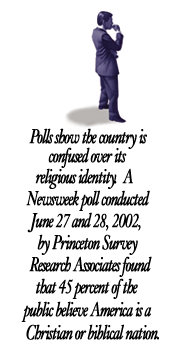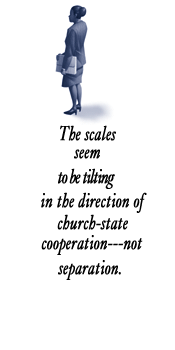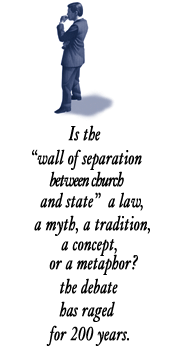A Wall of Confusion
Timothy R. Callahan September/October 2003
Getting your Trinity Audio player ready...
The understanding that the freedom of religion clause in the First Amendment was intended to erect "a wall of separation between church and state" is rapidly becoming pass̩ and is already regarded by many with actual hostility.
This wall view was espoused in a letter from Thomas Jefferson to the Danbury, Connecticut, Baptist Association in 1802, and reiterated and empowered by former Supreme Court Justice Hugo Black in Everson v. Board of Education
in 1947 (330 U.S. 156). Some church-state experts see the movement away from the wall view as a result of public confusion over the meaning of the separation of church and state, a patriotic surge after September 11, and new church-state scholarship questioning both Jefferson's intent and Black's integrity.
However, if the wall view collapses, the result may be, not what its demolition experts intend (the building of a Christian nation), but the creation of a national electoral religion, up for a vote every two to four years.

Confusion Over
Church-State Issues
The American public is indeed confused about the meaning of the separation of church and state. As Charles Haynes, senior scholar at the Freedom Forum's First Amendment Center, told Liberty: "Many Americans are confused about the meaning of 'separation of church and state' because each side in the culture wars has used the metaphor to attack the other. On one end of the spectrum some strict separationists have insisted that the First Amendment requires removal of all references to religion in the public square of America. On the other end some religious conservatives argue that 'separation of church and state' is a dangerous metaphor that is a false interpretation of the First Amendment."
Haynes also said that some religious groups favor church and state mingling because they see no alternative, believing—"rightly or wrongly"—that the public square is hostile to their faith. The groups believe that if they don't do something to protect their faith through government, they may find themselves unable to express their faith at all. However, Haynes said, "Once people understand that religion isn't barred from public life—including public schools—they are less supportive of attempts to push their religion through government action."
Haynes said that most local communities support church-state separation as "a key principle of religious liberty—once they understand what this means. If church-state separation is understood as keeping the government out of the religion business—while simultaneously protecting the right of citizens to bring their religion into the public square—then the principle of separation enjoys high support among the American people."
But Daniel Dreisbach, law professor at American University, told Liberty the public has a hard time understanding church-state separation because different religious groups have different understandings on the issue of separation of church and state. "You can talk to a Catholic bishop, a Southern Baptist pastor, a mainline Protestant minister, a Mormon elder, and a secular humanist," he said, "and all are likely to say they believe in the separation of church and state. But I suspect there will be a great variation in what each means by the phrase."
Polls show the country is confused over its religious identity. A Newsweek poll conducted June 27 and 28, 2002, by Princeton Survey Research Associates found that 45 percent of the public believe America is a Christian or biblical nation, 45 percent think America is a secular nation, and 10 percent are not sure what the country is. According to the Rutherford Institute's Web site (rutherford.org), one poll found 69 percent of Americans think the First Amendment contains the phrase "the wall of separation of church and state" (it does not). Yet a Pew Forum on Religion and Public Life poll conducted March 15-18 found that 75 percent of those surveyed supported government funding for faith-based funding initiatives. And the Newsweek poll showed, by a margin of 54 to 36 percent, with 10 percent undecided, that Americans think the government should not avoid promoting religion in any way.
Judges Also Confused
In October last year U.S. district judge Myron Thompson indicated that confusion over church and state separation would lessen once he made a decision on a lawsuit requesting that a Ten Commandments monument display outside an Alabama court building be removed. He pronounced to the press that "the whole case turns on whether the state can acknowledge God."1 On November 18 last year he made his ruling. The monument must be removed. However, Judge Thompson said he did not believe that all Ten Commandments displays in government buildings were illegal. Alabama chief justice Roy Moore, the defendant in the case because it is his monument, stated the obvious: "There is great confusion in the federal courts on this issue." Thompson illustrated this confusion, Moore's lawyer said, when he stated in the courtroom, "It is too dangerous to try to define the word 'religion'"; yet Thompson used the word "religion" 97 times in his opinion.2
Evangelical leaders are confused. Evangelists Pat Robertson and Jerry Falwell both said on television that the terrorist attack on September 11, 2001, was God's judgment on a country whose leaders, prompted by left-wing lobbying groups, want to take God out of the schools and the public square. They quickly turned around and apologized for their statements.
Christians as a whole are confused. Many Christians feel they should steer clear of the worldly realm of politics. Christians are to be "in the world but not of it." However, Bill Haynes, of the American Center for Law and Justice, a constitutional public interest law firm, questioned how Christians can not be involved. God makes no distinction between sacred and secular, he said, as everything Christians do is to be sacred and carried out for God.3 Even if Christians do become more involved in politics, and push even harder for more of church in government, exactly what church of the hundreds of sects or denominations will they be pushing?
Lobbyists and activists on both sides seem to be confused. Separationist organizations cry out that the conservatives are winning and that America is heading toward a theocracy run by religious fanatics. Conservative organizations cry out that the godless pagans are winning and that America is about to lose God's blessing, and possibly even be destroyed. Both sides plead with people to join their group in the fight—to keep the other side from winning. The question is begged: Are the groups for something, or against something else? And who wants to join a loser? Confusion.
The fact is, both separationists and antiseparationists have won major victories in the past year. On the one hand, separationists received favorable rulings in the Alabama Ten Commandments case; the June 26 ruling by the Ninth Circuit Court in Newdow v. U.S. Congress that the words "under God" be removed from the Pledge of Allegiance; and the rejection by Congress (178-239) of the Houses of Worship Political Speech Protection Act (HR 2357). On the other hand, the antiseparationists can lay claim to victories such as the Supreme Court's 5-4 decision in Zelman v. Simmons-Harris, which upheld Cleveland's school voucher plan as constitutional; public support for faith-based initiatives; a Christian president who publicly displays his faith; and a Republican-controlled government far more favorable toward the Religious Right than were the Democrats. Combine the antiseparationists' victories with the public's new views on church-state issues, however, and the scales seem to be tilting in the direction of church-state cooperation—not separation.

Terrorism Leads to
Surge in Patriotism
There is another reason the "wall of separation between church and state" view is becoming pass̩ and even regarded with hostility: terrorism.
John Whitehead, constitutional attorney and president of the Rutherford Institute, stated that the Pledge of Allegiance was approved by Congress in 1942 and then ruled a voluntary—not mandatory—pledge for schoolchildren by the Supreme Court in 1943. He said the words "under God" were added in 1954 out of the fear that godless Communism was infiltrating our society. "Who could save us?" was the question. He says, "The answer for many was 'God.'"4
We are in much the same situation today with the war on terrorism, says C. Welton Gaddy, executive director of the Interfaith Alliance. The terrorist attacks have the people singing "God Bless America" at "virtually every religious and public gathering." Gaddy says that "everything from billboards to pizza boxes" is now imprinted with the words "In God We Trust." To challenge these slogans, he said, is
seen as "a softness on terrorism and a weakness
on patriotism."5
But are some of the public thinking clearly—spiritually—on the issue? Is God on only our side? Isn't that the same thing the Islamic fundamentalist terrorists thought as they gave their lives, and took thousands of others, on September 11 for their God?
According to the Bible, God "shows no partiality" and is "not willing that any should perish." Including Muslims. They can't be saved if they are dead. And Jesus, God incarnate, rejected the Jews' attempts to make Him a political king to lead the fight against the pagan Roman Empire. Jesus said, "My kingdom is not of this world." His whole ministry was spent trying to change people's hearts, not the Roman government. "Render therefore to Caesar the things that are Caesar's, and to God the things that are God's," He said. His renderings were helping the poor and oppressed—widows, lepers, prostitutes, sinners, the lost—and challenging the religious traditions of humanity. Jesus told His disciples to love their "enemies, bless those who curse you, do good to those who hate you, and pray for [them]"—not bomb them back to the Stone Age. The Bible says Christians are to respect and obey those in authority, and to disobey only if obeying would break God's laws.6 Is it the Bible that is confusing, or is it that some Christians are confused?

New Scholarship
Some Americans may not be totally confused or afraid of terrorism; they may be taking a new view of the First Amendment because of new scholarship. Three books have recently been released: Dreisbach's Thomas Jefferson and the Wall of Separation Between Church and State (New York University Press, 2002), Michael Novak's On Two Wings (Encounter Press, 2001), and Philip Hamburger's Separation of Church and State (Harvard University Press, 2002).
Dreisbach and Hamburger have asserted that Justice Hugo Black's "wall of separation" argument rose out of anti-Catholicism and his fear of religious influence on public life. Moreover, Dreisbach said the words "separation of church and state" are a metaphor that does not correctly interpret the First Amendment's clause on religion.7
Of course, separationists claim the new scholarship is biased and flawed. J. Brent Walker, of the Baptist Joint Committee, said of Hamburger's book, "Hamburger could not be more wrong," when he tries to "debunk what he calls the 'modern myth' of the separation of church and state." Walker admitted that Jefferson and James Madison didn't use the word "separation" in the eighteenth century, but said that reading some of their later writings leads to the conclusion that "they unequivocally supported the concept."8
And therein lies the confusion. Is the "wall of separation between church and state" a law, a myth, a tradition, a concept, or a metaphor? The debate has raged for 200 years, but while religion's role in government is still undecided, the government's role in religion has always been clear. According to the First Amendment, government is to have no role in the establishment of religion or in prohibiting the free exercise of religion.
Religious groups have to think long and hard about government endorsement of religion. If the 2003 brand of U.S. government endorses, say, the Christian religion, what is to stop the next brand of U.S. government from endorsing a different religion? As the Supreme Court said in the Pledge of Allegiance decision: "A profession that we are a 'nation under God' is identical, for establishment clause purposes, to a profession that we are a nation 'under Vishnu,' a nation 'under Zeus,' or a nation under 'no god,' because none of these professions can be neutral with respect to religion."9
While confusion, terrorism, and new scholarship may be the reasons the country is shifting away from the "wall of separation" view held for more than 50 years, the end results of a shift in understanding may be unexpected and unwanted. Our elected representatives or appointed judges might, a few years down the road, have quite a strange range of religious views. And those views, along with the parties in power, would also change.

1 Associated Press wire story, Oct. 24, 2002.
2 Associated Press wire story, Nov. 19, 2002.
3 Bill Haynes, "A Biblical Perspective on Religion and Politics," acljorg/news, posted 2002.
4 John Whitehead, "The Great Pledge Debate," November/December, 2002, at libertymagazine.org.
5 C. Welton Gaddy, "Under God Freedom," November/December, 2002, at libertymagazine.org.
6 Scriptures quoted and paraphrased in this paragraph are from the New King James Version. Copyright